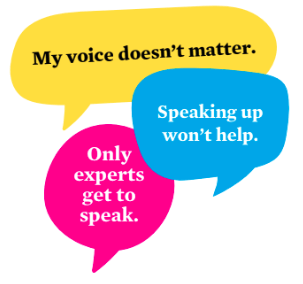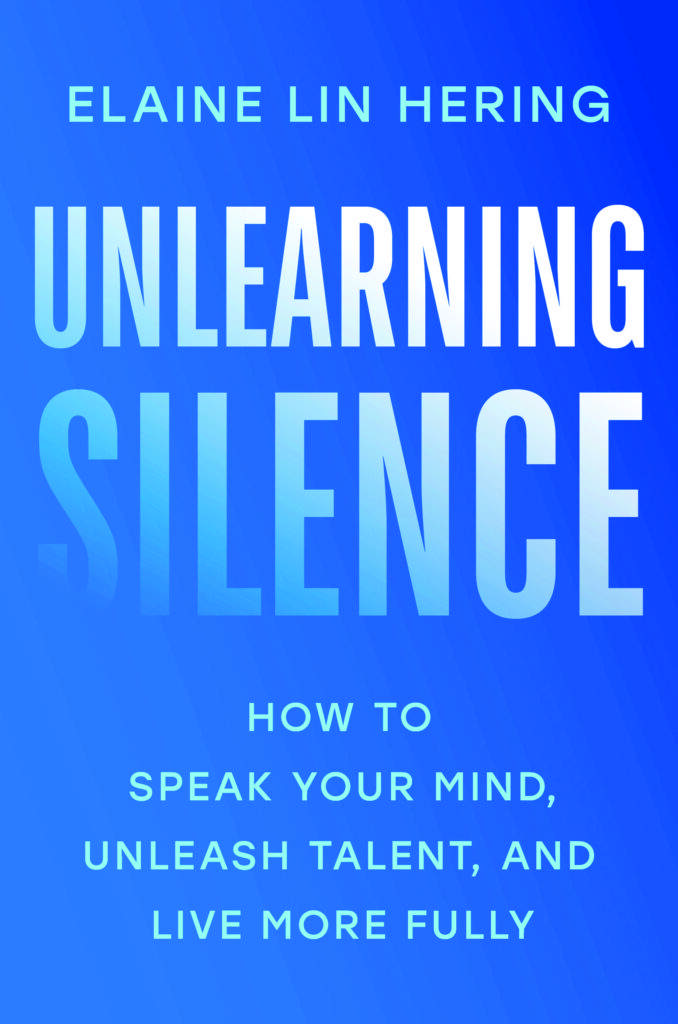Whether we want to share an idea or innovation, push back against a strategy we’re convinced won’t work, or have a hard conversation with a friend, speaking up can be costly.
When deciding whether to speak up, we need to figure out whether and how to say something. Most of us are also anticipating and calculating the emotional and relational impacts the comment will have on the other person, ourselves, and the systems in which we live and work.
In a decade of consulting with professionals to handle difficult conversations, I’ve noticed a particular dynamic. Very few people are as clear or direct as they think they are. In fact, 45% of Americans—myself included—regularly self-censor for fear that expressing their view will isolate and alienate them from others.
What we say—and what we don’t—impacts the quality of work assignments we receive, the reputation we build, and, at worst, whether we have a livelihood or physical safety. By becoming aware of why people often silence themselves, you can notice whether you do this, too—and whether doing so serves you.
We Assume Our Voices Don’t Matter
We each hold different assumptions about the value of our voice and the unspoken rules about who gets to speak and what happens as a result of it:
And these assumptions can drive our behaviors. Known as the cofounder of organizational development, business theorist and professor Chris Argyris introduced the concept of double-loop learning in the 1970s. Single-loop learning looks only at the feedback from an action to review a decision. Double-loop learning questions the internalized assumptions that drive the decisions in the first place. If we really want to change the results we’re getting, we need to look not only at the behaviors that led to those results, but at the assumptions behind them.
For example, if I stayed silent in a meeting and things didn’t go my way, single-loop learning would say that my choices going forward are speak up or stay silent—neither of which feels doable or satisfying. But if I look at the assumptions that made me stay silent, I’d realize that I don’t think it’s worth my time to speak up because I’m convinced that managers never listen.
We know that using our voices is important for us individually, for the people around us, and for the world. But over time, we start to assume our voices don’t matter.
How does that happen?
1. We focus too much on others’ expectations.
Understanding others’ expectations is part of being a considerate family member, coworker, and human being. But many of us have overrotated to the point that everything is about other people.
For example, for people whose parents moved to a different country to provide “a better future” for their children, it’s usually clear what you’re supposed to be doing in life—make good on your parents’ sacrifice by making the most of the opportunities before you. Much of the time, that means getting a job that pays well and attaining socioeconomic security. The question to answer is not what do I want to do, but what should I be doing?
The question to answer is not what do I want to do, but what should I be doing?
When expectations rule our lives, we forget that our own needs and preferences matter. Finding our voices is an opportunity to recalibrate and consider: What matters to me? What do I want to put energy, time, and effort toward?
2. We give in to peer pressure.
After years of working as a professional commercial baker, Gabby started her own shop. She chose to pay her employees above the average rate for the industry. “As a small business trying to grow, you should be investing money back into the business,” the adviser told her. “You can get away with paying people market rate.”
Gabby was torn. She knew the hustle of being in the food industry. Just because she could pay less didn’t mean that she wanted to. Her brother was quick to remind her, “You’re a baker, not a businessperson.”
Gabby listened. With her next hire, she lowered the hourly rate. Months later, her team members came to her. “Why is Rachel paid less than us? We do the same job. We thought we could trust you.” Gabby felt like she had been caught red-handed.
Over time, taking on advice that doesn’t sit well with us can dull our instincts to the point where we no longer think they’re valuable.
When we repeatedly give in to pressure from others to act a certain way, we diminish the value of our preferences and our sense of voice. We silence ourselves when we go along with what others want for us, even though what they want doesn’t seem right to us. Over time, taking on advice that doesn’t sit well with us can dull our instincts to the point where we no longer think they’re valuable.
3. We value sameness over uniqueness
Mimicry—the unconscious tendency to imitate—is a well-documented phenomenon among humans. When we depend on, feel close to, or want to be liked by others, we unconsciously mimic their behavior. People tend to have more positive judgments about, be more willing to help, and say yes to people who mimic them.
The effects of mimicry make sense—after all, there is an ease to engaging with people who act like us. When entering a new workplace, taking time to observe the existing system is wise. This is especially true when you hold subordinated identities because your place in a system is already more tenuous. At the same time, mimicry—particularly being rewarded for our mimicry—dulls our unique way of showing up in the world.
When I first started in corporate education, I mimicked what the founders of our firm did. After all, they were senior faculty at Harvard and authors of a New York Times bestselling book. There was already a stamp of approval on their way of doing things. I learned to describe concepts and engage clients as they did, so much so that one client noted we had the same enunciation.
When people requested me for client work, I thought it was because I was a good imitation of our founders, but at a lower rate. One day, a client said she didn’t want a founder for the work. In fact, she wanted me because of the heart and insight I brought.
Slowly but surely, I am choosing to embrace rather than hide my uniqueness. I’m starting to assume that my voice matters. Given the agency, ability, and opportunity to make decisions, what will my approach be?








